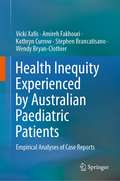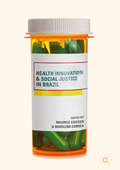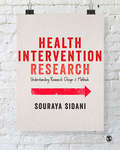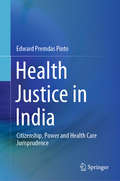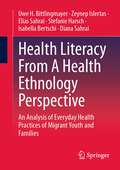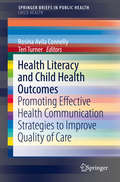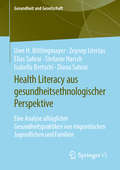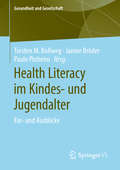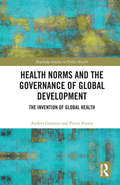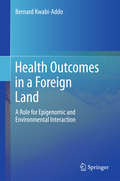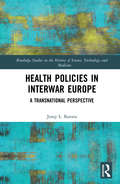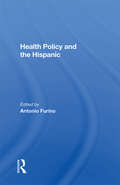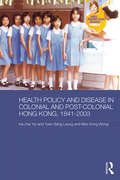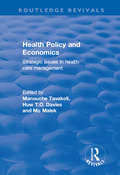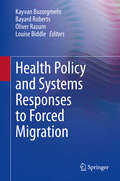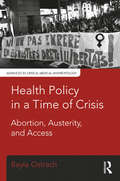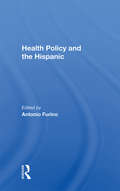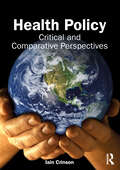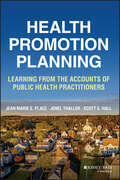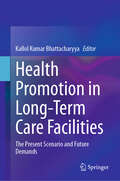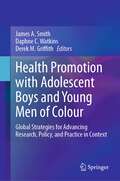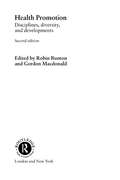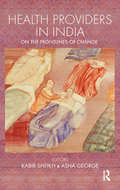- Table View
- List View
Health Inequity Experienced by Australian Paediatric Patients: Empirical Analyses of Case Reports
by Vicki Xafis Amireh Fakhouri Kathryn Currow Stephen Brancatisano Wendy Bryan-ClothierThis book provides rare insight into how real children/adolescents’ lives unfold as a result of health inequity. The authors present the findings of empirical research into the health and social circumstances of 61 Australian children/adolescents, as reported by healthcare professionals who attended to their medical needs, revealing how healthcare professionals deal with health inequity on the ground. Profound inequities in the health and wellbeing of children/adolescents worldwide have been the focus of intense research for decades. The extent to which children/adolescents’ health and wellbeing is impacted by violence, poverty, their inability to access integrated healthcare services, parental and adolescent substance abuse, unemployment, poor living conditions, poor nutrition, a fractured social support network, disrupted education, and lack of transportation, is widely recognized. While essential, statistical analyses alone cannot reveal the faces of those experiencing health inequity. This work highlights the need for urgent coordinated action to address health inequity so that children and young people have a chance to lead a full life in good health. It is relevant to researchers and practitioners whose work relates to improving children and young people’s lives.“This book should be required reading for those who influence policies developed by all the sectors mentioned above and their funding and administrative bodies – and politicians in particular” (Anonymous Reviewer).
Health Innovation and Social Justice in Brazil
by Maurice Cassier Marilena CorreaThis book examines the construction of an innovation system in Brazil’s health industries over the past twenty years. The authors argue that the system has remained active despite the crisis that began in 2014. However, while this crisis has led to cuts in public spending on research and health, it has simultaneously tended to stimulate local production and invention aimed at reducing deficits in the trade in medicines and medical technologies. The contributors highlight a model combining the acquisition of new technologies with social justice and the right to health, and introduce new concepts of the “nationalization” of technologies, innovation through copying and civil society regulation of industrial property and of the medicinal drug market.
Health Intervention Research: Understanding Research Design and Methods
by Souraya SidaniAt a time when evidence-based practice is the standard bearer for understanding health behaviour, problems and interventions, ensuring that researchers know the appropriate designs and methods for their research is more paramount than ever. Health Intervention Research will equip those doing research in these communities with the knowledge and tools they need to inform their methodological decisions when planning and conducting studies. This book describes both commonly used (e.g., randomized clinical trials) and advanced (e.g. preference trials, pragmatic trials) designs and methods for health intervention research. It outlines the theoretical reasoning underlying these different approaches, and synthesizes the evidence which supports or disputes different designs and methods. To achieve its aims, the book is divided into three main sections. The first section points to the need to base methodological decisions on evidence and highlights the importance of carefully selecting research designs and methods to maintain validity. The second section focuses on designs to determine the effects of intervention on outcomes, outlining their features and discussing how these can be used to evaluate interventions. The last section covers methods used in conducting intervention evaluation research. For each design and method, the following is covered: what it is, what the logic underlying it is, what the evidence supporting its effectiveness is, and also includes its advantages, its limitations, and how can it be implemented. This will be key reading for postgraduates and novice researchers in health and clinical psychology, health sciences and nursing.
Health Intervention Research: Understanding Research Design and Methods
by Souraya SidaniAt a time when evidence-based practice is the standard bearer for understanding health behaviour, problems and interventions, ensuring that researchers know the appropriate designs and methods for their research is more paramount than ever. Health Intervention Research will equip those doing research in these communities with the knowledge and tools they need to inform their methodological decisions when planning and conducting studies. This book describes both commonly used (e.g., randomized clinical trials) and advanced (e.g. preference trials, pragmatic trials) designs and methods for health intervention research. It outlines the theoretical reasoning underlying these different approaches, and synthesizes the evidence which supports or disputes different designs and methods. To achieve its aims, the book is divided into three main sections. The first section points to the need to base methodological decisions on evidence and highlights the importance of carefully selecting research designs and methods to maintain validity. The second section focuses on designs to determine the effects of intervention on outcomes, outlining their features and discussing how these can be used to evaluate interventions. The last section covers methods used in conducting intervention evaluation research. For each design and method, the following is covered: what it is, what the logic underlying it is, what the evidence supporting its effectiveness is, and also includes its advantages, its limitations, and how can it be implemented. This will be key reading for postgraduates and novice researchers in health and clinical psychology, health sciences and nursing.
Health Justice in India: Citizenship, Power and Health Care Jurisprudence
by Edward Premdas PintoThis book presents important fields of research in public healthcare in India from an interdisciplinary and health systems perspectives. Discussing how the exchange of power between the health justice triad, viz., the State (judiciary as the arm of the State), legal and medical professions, and civil society, cumulatively shapes the outcomes of health justice for citizens, it provides insights into India’s juridico-legal processes and of seeking justice in healthcare. It critically assesses civil society’s counter-hegemonic role in bolstering justice in health care and examines the potential of transforming health care jurisprudence into health justice. Repositioning the social right to healthcare as integral to social citizenship and social justice, and opening avenues for inter-professional and interdisciplinary power discourse in public health policy research, the book is of interest to academics, practitioners, students, researchers, and the wide academic community working in public health care issues broadly.
Health Law and Medical Ethics in Singapore
by Gary Chan Kok YewThis book encompasses two inter-related disciplines of health law and medical ethics applicable to Singapore. Apart from Singapore legal materials, it draws upon relevant case precedents and statutory developments from other common law countries and incorporates recommendations and reports by health-related bodies, agencies and committees. The book is written in an accessible manner suitable for tertiary students. It should also serve as a useful resource for medico-legal practitioners, academics and healthcare professionals who wish to keep abreast of the evolving legal and ethical developments concerning health and medicine.
Health Literacy From A Health Ethnology Perspective: An Analysis of Everyday Health Practices of Migrant Youth and Families
by Uwe H. Bittlingmayer Zeynep Islertas Elias Sahrai Stefanie Harsch Isabella Bertschi Diana SahraiThis book presents a health ethnology of health literacy among vulnerable groups. In addition to a comprehensive state of research and the development of a theory-oriented health literacy research, three case studies on vulnerable minorities from Germany and Switzerland are presented. The social dimension of health and health literacy, which can hardly be conceptualized in the individualistic competence-theoretical approaches, is particularly clearly highlighted. This book is a translation of the original German 1st edition Health Literacy aus gesundheitsethnologischer Perspektive by Uwe H. Bittlingmayer, published by Springer Fachmedien Wiesbaden GmbH, part of Springer Nature in 2020. The translation was done with the help of artificial intelligence (machine translation by the service DeepL.com). A subsequent human revision was done primarily in terms of content, so that the book will read stylistically differently from a conventional translation. Springer Nature works continuously to further the development of tools for the production of books and on the related technologies to support the authors.
Health Literacy and Child Health Outcomes
by Rosina Avila Connelly Teri TurnerThis compact resource presents current data on health literacy as it affects child health outcomes, with a sharp focus on improving communication between healthcare providers and pediatric patients and their families. A frequently overlooked social determinant of health in children, health literacy is shown as a critical skill for patients and families and a key aspect of patient engagement. The authors' evidence-based survey pinpoints common problems in healthcare providers' verbal and written communication with pediatric patients, their parents, and/or caregivers. Readers will learn about practical health literacy strategies for addressing and preventing miscommunication at the individual and systems levels. These improvements are linked to immediate results (e. g. , greater compliance, fewer medication errors) as well as improved long-term child health outcomes, including reduced health disparities and enhanced quality of life into adulthood. This transformative guide: #65533; Defines optimum health communication as necessary for working with all patients. #65533; Identifies common barriers to clear health communication. #65533; Traces the relationship between health literacy and child health outcomes, from the prenatal period and into young adulthood. #65533; Offers guidelines for creating effective patient education materials and a safe, health literacy oriented patient-centered environment. #65533; Integrates health literacy into health systems' quality improvement plans. Health Literacy and Child Health Outcomes informs students in MPH programs as well as public health scientists and scholars, and can also serve as an introductory text for students in public health ethics or a general applied ethics course. Public health professionals in diverse contexts such as local health departments and nonprofit organizations will appreciate its robust approach to ethical practice, professional development, and systems improvement. This will be a helpful guide for introducing health communication topics in medical education and allied health. Lastly, clinicians taking care of pediatric patients will find concise information and practical advice to apply in the clinical setting.
Health Literacy aus gesundheitsethnologischer Perspektive: Eine Analyse alltäglicher Gesundheitspraktiken von migrantischen Jugendlichen und Familien (Gesundheit und Gesellschaft)
by Uwe H. Bittlingmayer Zeynep Islertas Elias Sahrai Stefanie Harsch Isabella Bertschi Diana SahraiIm vorliegenden Buch wird eine Gesundheitsethnologie der Gesundheitskompetenz von vulnerablen Gruppen vorgelegt. Dabei werden neben einem umfassenden Forschungsstand und die Entwicklung einer theorie-orientierten Health-Literacy-Forschung drei Fallstudien über vulnerable Minderheiten aus Deutschland und der Schweiz präsentiert. Besonders deutlich herausgestellt wird die soziale Dimension von Gesundheit und Gesundheitskompetenz, die in den individualistischen kompetenztheoretischen Zugängen kaum konzeptionalisiert werden kann.
Health Literacy im Kindes- und Jugendalter: Ein- und Ausblicke (Gesundheit und Gesellschaft)
by Paulo Pinheiro Torsten M. Bollweg Janine BröderDas Thema Health Literacy, für das sich im deutschen Sprachgebrauch der Begriff der Gesundheitskompetenz etabliert hat, hat in der jüngeren Vergangenheit eine spürbare Aufwertung in Praxis, Politik und Forschung erfahren. Inhaltlich setzt es sich mit vielfältigen Aspekten des Umgangs mit gesundheitsbezogenen Informationen auseinander und adressiert somit eine Gelingensbedingung für den Erhalt und die Förderung von Gesundheit. Kinder und Jugendliche werden in diesen Kontexten zwar als hochrelevante Zielgruppe angesehen, sind in einer wissenschaftlichen Perspektive auf den Gegenstand bislang jedoch noch nicht ausreichend explizit berücksichtigt worden. Mit dem vorliegenden Sammelband wird ein strukturierender Überblick über den gegenwärtigen Forschungsstand zum Thema Health Literacy im Kindes- und Jugendalter gegeben. Die Sammlung von Beiträgen setzt sich einerseits aus Einblicken in eine Reihe von Forschungsergebnissen zusammen, die sich mit der Tätigkeit des Forschungsverbunds ‚Health Literacy in Childhood and Adolescence (HLCA)‘ assoziieren lassen, und bietet andererseits zahlreiche Anknüpfungspunkte an, die Ausblicke auf künftige Ausrichtungen des Handlungsfelds Health Literacy ermöglichen.
Health Norms and the Governance of Global Development: The Invention of Global Health
by Pieter Fourie Anders GranmoThis book maps the emergence of health in global development discourse and governance since 1990. It argues that health norms have emerged, diffused, and subsequently become internalised through the various direct and indirect negotiation processes that created the global development goals. Covid-19, Ebola, and HIV/AIDS are prime illustrations of the fact that health is supremely political. Governments – whether they are local, national, international, or multilateral – make decisions about their policy responses, coordinate their response, and channel the necessary resources. Such decisions are informed by local and global conditions as well as sets of values, norms, and standards that determine policy and interventions. As states and regions become more interconnected, the politics of health are increasingly relevant to the sustainable future envisioned by global governance. This book explains how considerations of global health have come to inform and infuse the United Nations development agenda. It identifies processes, actors, institutions, and interactions in global health by analysing two related case studies: the Millennium Development Goals and the Sustainable Development Goals. Providing an overview of, and insights about, the context of global development thinking and practice, the subtleties of global health, and global health governance, this book is an innovative contribution to the literature. It is suitable for students and scholars of global health, development studies, and international relations.
Health Outcomes in a Foreign Land
by Bernard Kwabi-AddoThis stimulating volume uses multiple lenses to analyze the complex causes of health disparities affecting African Americans, and explains how this knowledge can be used to reduce their destructive effects. Pinpointing genetic, non-genetic, and epigenetic factors underlying health conditions common to the population--including heart disease, hypertension, diabetes, and cancer--the author traces intricate links among these factors in the current environmental and social context. The section on non-genetic factors in health disparities, such as social determinants and health behaviors, add depth to the ongoing discourse on public health and health policy objectives. And the chapters on gene/environment interactions outline the vast potential for developing new multidisciplinary frontiers in shrinking health inequities and personalizing care. Included in the coverage: The African diaspora and disease-specific disparities. The genetic basis to health disparities. The role of epigenetics Economic factors and health Psychological issues and how they affect disparities Gene-environment interactions in health disparities Race, a biological or social concept Compelling and accessible, Health Outcomes in a Foreign Land will challenge and inspire medical students, epidemiologists, public health professionals, biomedical research scientists, and social scientists to go farther in their work. A wider audience would include policymakers, government officials, nurses, physicians, lawyers, economists, community outreach investigators, and interested general readers.
Health Policies in Interwar Europe: A Transnational Perspective (Routledge Studies in the History of Science, Technology and Medicine)
by Josep L. BaronaResearch into public health policies and expert instruction has been oriented traditionally in the national context. There is a rich historiography that analyses the development of health policies and systems in various European and American countries during the first decades of the twentieth century. What is often ignored, however, is the study of the great many connections and circulations of knowledge, people, technologies, artefacts and practices during that period between countries. This book redresses that balance.
Health Policy And The Hispanic
by Antonio FurinoExploring the many dimensions of Hispanic health issues, this book updates interested readers with recent information and offers a view of the depth, scope, and complementarity of the challenges of providing adequate health care. Accordingly, the book is organized in four sections addressing, first, the conceptual, institutional, and policy elements of the problems and their solutions; second, the clinical evidence about diseases for which Hispanics are disproportionally at risk; third, social and economic factors that have an impact on the health status of Hispanics; and, fourth, future policy options that could improve the health conditions of this increasingly large and underserved group of Americans. While clarifying the issues, the book documents the importance of seeking solutions to Hispanic health problems with determination and haste. Hispanics will soon represent the largest minority in American society. And, 20 million people with Latin American and Spanish origins contribute a large, youthful, and potentially very productive group of workers to our aging labor force. Finally, in searching for solutions to Hispanic health challenges, we learn that in order to improve the health of all Americans, while containing costs, it is necessary to address, proactively, the special needs of our culturally diverse society.
Health Policy and Disease in Colonial and Post-Colonial Hong Kong, 1841-2003 (Routledge Studies in the Modern History of Asia)
by Ka-che Yip Yuen Sang Leung Man Kong WongBesides looking at major outbreaks of diseases and how they were coped with, diseases such as malaria, smallpox, tuberculosis, plague, venereal disease, avian flu and SARS, this book also examines how the successive government regimes in Hong Kong took action to prevent diseases and control potential threats to health. It shows how policies impacted the various Chinese and non-Chinese groups, and how policies were often formulated as a result of negotiations between these different groups. By considering developments over a long historical period, the book contrasts the different approaches in the periods of colonial rule, Japanese occupation, post-war reconstruction, transition to decolonization, and Hong Kong as Special Administrative Region within the People’s Republic of China.
Health Policy and Economics: Strategic Issues in Health Care Management (Routledge Revivals)
by Mo Malek Manouche Tavakoli Huw T.o. DaviesThis title was first published in 2001: The papers in this volume, selected from nearly 100 submissions to the Fourth International Conference on Strategic Issues in Health Care Management, reflect the work taking place in health economics. The first five chapters in the collection examine the role of economics within clinical guidelines and suggest methods of improving the quality of economic evaluation which is now at the centre of decision-making in the NHS. The second section of the book is comprised of two papers on inequalities and access. The third part contains four papers, two of which cover reviews and tackle some theoretical issues regarding demand, and two are applied case studies. The fourth section assesses performance, and the final four papers review health reforms in a number of countries including the UK, Canada, France and Turkey.
Health Policy and Systems Responses to Forced Migration
by Oliver Razum Kayvan Bozorgmehr Bayard Roberts Louise BiddleForced migration has yet to be sufficiently addressed from the perspective of health policy and systems research, resulting in limited knowledge on system‐level interventions and policies to improve the health of forced migrants. The contributions within this edited volume seek to rectify this gap in the literature by compiling the existing knowledge on health systems and health policy responses to forced migration with a focus on asylum seekers, refugees, and internally displaced people. It also brings together the work of research communities from the fields of political science, epidemiology, health sciences, economics, psychology, and sociology to push the knowledge frontier of health research in the area of forced migration towards health policy and systems-level interventions, while also framing potential routes for further research in this area. Among the analyses within the chapters: The political economy of health and forced migration in EuropeInnovative humanitarian health financing for refugeesUnderstanding the resilience of health systemsHealth security in the context of forced migrationDiscrimination as a health systems response to forced migration Health Policy and Systems Responses to Forced Migration offers unique and interdisciplinary theoretical, empirical, and literature-based perspectives that apply a health policy and systems approach to health and healthcare challenges among forced migrants. It will find an engaged audience among policy makers and analysts, international organizations, scholars in academia, think tanks, and students in undergraduate programs or at the graduate level, for policy, practice, and educational purposes.
Health Policy in a Time of Crisis: Abortion, Austerity, and Access (Advances in Critical Medical Anthropology)
by Bayla OstrachHealth Policy in a Time of Crisis is a vivid ethnographic account of women and providers navigating the Catalan health system to obtain and provide publicly funded abortion care. Grounded in critical medical anthropology, the book situates access to publicly funded abortion care in the context of austerity and ongoing threats to recently liberalized laws, examining the actual levels of access in the region. In so doing, it examines the disparities experienced by immigrant and other women, documenting the diverse approaches adopted to overcome obstacles to care. Using accounts from both providers and women seeking care, Ostrach’s richly grounded analysis illuminates a healthcare system during a period of economic crisis and disagreement over reproductive governance. Researched against a backdrop of growing movements against austerity and for Catalan independence, the result is at once a study of true access to public health care in times of crisis and a compelling account of some women’s determination to go to any length to get the health care they need. Engagingly written, it will make interesting reading for scholars and students of anthropology and public health, as well as policymakers and the general reader concerned with the politics of abortion and public health.
Health Policy/spec Sale/avail Hard Only
by Antonio FurinoExploring the many dimensions of Hispanic health issues, this book updates interested readers with recent information and offers a view of the depth, scope, and complementarity of the challenges of providing adequate health care. Accordingly, the book is organized in four sections addressing, first, the conceptual, institutional, and policy element
Health Policy: Critical and Comparative Perspectives
by Iain CrinsonThis important new textbook provides comparative and critical analysis of health care policy from high-income countries in Europe to low-income developing countries in the Global South.It integrates conceptual themes drawn from the fields of sociology, policy analysis, and political science to offer a unique combination of theory, historical background, and wider social commentary. The book is divided into three sections: Section I establishes the conceptual basis for the analysis of the health policymaking process, including implementation. Section II provides an introduction to the key elements of conducting a comparative health system’s analysis, including chapters that provide examples of performance analysis in both high- and low-income developing countries. Section III examines key challenges now facing health policy-makers that include long-term social care provision, widening the scope of public health to address social inequalities in health outcome, the integration of genomic medicine within a health care system, and the establishment of an effective national pharmaceutical policy. Each chapter includes case studies, historical-institutional contexts, and summaries of key health policies. Detailed and clearly written, it is the ideal text for health and social science students in this expanding area of analysis.
Health Promotion Planning: Learning from the Accounts of Public Health Practitioners
by Jean Marie Place Jonel Thaller Scott S. HallHEALTH PROMOTION PLANNING “I find this book to be an invaluable resource, offering a comprehensive guide for assessing and addressing public health issues. Its unique blend of theoretical insights and real-world narratives provides a nuanced understanding of interventions in practical contexts. This book is an essential tool for both current and aspiring professionals in the public health sector.” —DANE MINNICK, Indiana Division of Mental Health and Addiction Real stories, real solutions—a unique textbook that embeds definitions and descriptions of program planning principles within the story of one town grappling with the opioid crisis In Health Promotion Planning: Learning from the Accounts of Public Health Practitioners, you will embark on a journey through the heart of a small midwestern city, where a community grapples with the daunting challenges of the opioid epidemic. The book uses narratives in a creative and engaging way, weaving together the real-life accounts of over 100 public health practitioners. As you follow the saga of the town, you will see program planning principles in action. Through the intricacies of substance use and opioid-related challenges, this book sheds light on the interconnected efforts of diverse programs, including needs assessment, health education curriculum, health communication campaigns, environmental change strategies, peer support initiatives, and community organizing. Students and practitioners will uncover the principles and processes of building health promotion programs. Discussion questions and activities at the end of each chapter stimulate reflection and exploration, offering a valuable resource for instructors and individual learners. Health Promotion Planning is a powerful glimpse into public health practice, inspiring future generations to take up the mantle in addressing societal challenges. Learners will witness health promotion in action as they follow the compelling stories inside—where lessons are learned, lives are changed, and hope emerges from the frontlines of a devastating epidemic.
Health Promotion in Long-Term Care Facilities: The Present Scenario and Future Demands
by Kallol Kumar BhattacharyyaThis book discusses biopsychosocial barriers and facilitators of long-term care services, focusing on health promotional activities targeted to maximize quality of life. This knowledge of meaningful activities helps to identify and improve strategies for supporting people living in long-term care facilities with various chronic disorders at a deeper level. Although no all-encompassing theory of caregiving has yet been developed, this book explores various theoretical formulations as central aspects of promoting health in long-term care practices. The current culture change in long-term care controls the well-being of the concerned person physically, psychologically, socially, and economically. In later life, these issues profoundly impact individuals' morbidity and lifespan. Further, it has been evidenced that the Centers for Medicare & Medicaid Services' five-star rating system that provides long-term care facilities&’ quality information to the public does not fully represent what matters to the residents from their perspectives. Resident satisfaction is an integral part of the quality of care; instead of clinical quality measures only, it is influenced by residents, their family members, staff, and administration. Person-centered care not only requires a 'culture change' in how residents and caregivers work together, but it also requires facilities to ensure staff deliver care with the highest possible level of empathy and adopt meaningful care practices. Among the topics covered in this contributed volume: Are Quality of Care and Quality of Life Synonymous in Long-Term Care? Aging-in-Place or Long-Term Care? Changing the Narrative to Promote Aging in Place in Long-Term Care Person-Centered Care and Culture Change Movement in Long-Term Care <span style="mso-farea
Health Promotion with Adolescent Boys and Young Men of Colour: Global Strategies for Advancing Research, Policy, and Practice in Context
by James A. Smith Derek M. Griffith Daphne C. WatkinsThis book highlights novel and pragmatic health promotion efforts being adopted with boys and young men of colour (BYMOC) globally that apply a strengths-based approach. Men's adoption of risky health practices and reluctance to seek help and engage in preventive health behaviours have frequently been used to explain their poorer health outcomes, particularly among adolescent boys and young men, and disproportionately affecting BYMOC. Emerging literature on equity and men's health has conveyed that intersections among age, race, sexuality, socioeconomic status and geography contribute to a complex array of health and social inequities. There is growing evidence to suggest these inequities shape the health practices of BYMOC. Unfortunately, these health and social inequities can have negative lifelong consequences. An increased focus on reducing health inequities has led to a greater focus on health promotion actions that address social and cultural determinants of health.The vulnerabilities that BYMOC face are diverse and are reflected in a range of tailored health promotion interventions. Health promotion approaches that influence structural and systemic inequities experienced by BYMOC have been a prominent feature. In this volume, the editors and contributors purposefully bring together international research and promising practice examples from Australia, the United States, New Zealand, and Canada to celebrate health promotion strategies that help to improve the health and social trajectories of BYMOC. In doing so, the book moves beyond discussing the health inequities faced by this population, to talk about the practical actions to address them in context. Health Promotion with Adolescent Boys and Young Men of Colour brings together diffuse strands of scholarship relating to male health promotion, gender/masculinities and health, equity and men's health, and gender and youth development. The book is a unique and useful resource for practitioners, policy-makers, researchers and students with an interest in health promotion/public health, social work/social policy, education, men's health, youth development, Indigenous studies, and health and social equity.
Health Promotion: Disciplines and Diversity
by Gordon Macdonald Robin BuntonHealth promotion is an increasingly central tenet in health professionals' lives. It has come into the public eye as the subject of party politics and policy, but where does the movement come from?This book brings together views from a range of subjects, some not always associated with health promotion, such as marketing or communication theory. Others, such as social policy of psychology may have obvious connections to make; here the implications for practice are discussed fully for the first time. The volume adds up to a timely reflection on the state of health promotion today and will provide practitioners and academics alike with a clearer undersanding of a discipline at the frontier of contemporary policy and practice.
Health Providers in India: On the Frontlines of Change
by Kabir Sheikh Asha GeorgeThis volume has articles contributed by health researchers, practitioners, policy advocates, programme managers and a journalist, and poems by renowned poet–physician Gieve Patel. Each presents a distinctive view of a particular group of frontline health providers, based on field research or on the authors’ respective experiences of working with or as providers. The health providers addressed in this volume include doctors (working in the public and private sectors), nurses, public health workers, counsellors, traditional practitioners and homecare providers. Different groups of health providers face struggles at diverse frontiers — social, professional and systemic. In the context of reforming health systems, government health workers must constantly negotiate the vagaries of changing working environments and policy vacillations. For traditional and homecare providers, formal health systems and structures often only reject and exclude their contributions. Medical doctors, conversely, face difficult challenges of introspection, as they tread the line between personal gain and public service. The ideas and themes that emerge in this collection not only contribute to the understanding of providers’ roles as actors in the health systems and societies of contemporary India, but re-examines preconceptions about this critical occupational group. This volume advances the case for a deeper appreciation of India’s complex landscape of healthcare provision, and of the potential roles of frontline health providers as central figures in development.
